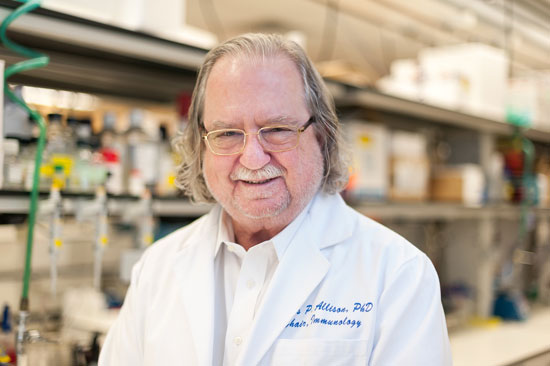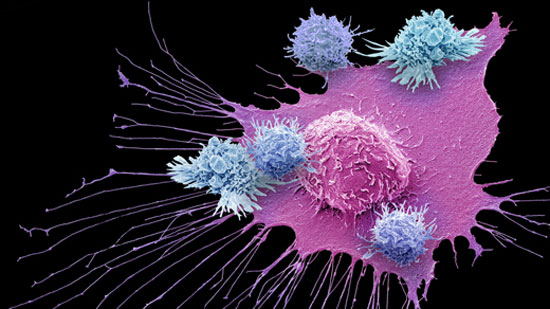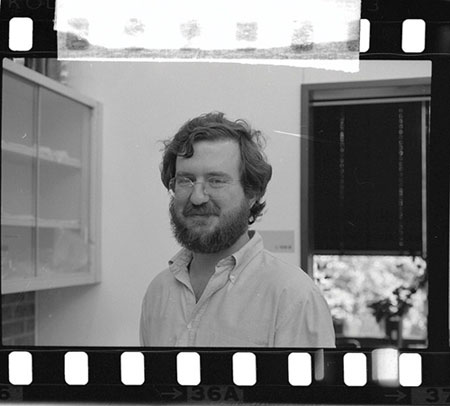Scientist Called ‘Foolish’ For Immune System Research Claims Nobel Prize For Cancer Cure
No one would argue that James Patrick Allison, simply known as Jim to friends, isn’t one of the biggest figures in immunology. He is the main man behind cancer treatments and drugs today.

But before his Nobel Prize win, Allison faced heavy skepticism from fellow oncology researchers. Most did not believe in his work, and many thought he was foolish. Imagine their surprise at his success!
Now, a documentary is even being made about Allison’s life to celebrate his findings and successes. Here’s everything you need to know about the scientist called “foolish” for his immune system research, who then claimed a Nobel Prize for a cancer cure.
Jim Allison’s research first began at the Scripps Clinic and Research Foundation, where he served as a postdoctoral fellow. He was trained under Professor Emeritus Ralph Reisfeld and he began to study human leukocyte antigens, or HLA, and T-cells.
Essentially, Allison’s work involved experimenting and researching how HLA proteins benefit the immune system, helping it to tell the difference between invading cells and welcome ones. A few years later, in 1977, Allison – along with one of his colleagues named G.N. Callahan – discovered something new, which they talked about in a letter they wrote to Nature.
Their findings indicated that they had found the reason behind the immune system’s reluctance to attack cancerous cells. Their research indicated that this was because antigens have an association with other proteins. Discovering this fact would serve as a big leap forward for Allison.
Breakthroughs: 1990s
In the 1990s, Allison’s work moved to Berkeley’s University of California. Here, he continued his research into cancer – and that’s when he became enthralled by a certain type of molecule: a protein receptor called CTLA-4.
CTLA-4 is a component that is only present on T-cell surfaces. At the time, it was believed to push the immune system to get into gear and fight infections and diseases. But when Allison – and Jeffrey Bluestone, who did similar research in San Francisco’s UC independently – conducted further research, he found that they actually did the opposite.
The molecule actually blocked natural immune responses, serving as a checkpoint of sorts and down regulating the usual immune system action. As such, the next best step would be to create an antibody that restricts or blocks CLTA-4, as this might be able to lead to better rejection of tumors and cancerous cells.
This led to a 1996 paper that served as a major breakthrough in cancer and immunology research. Allison and his lab created an antibody for this purpose and administered it on mice that had cancer. Tumors began to disappear.
The research paper discussed how this new approach to cancer treatment could be used in what they called a checkpoint blockade or checkpoint therapy – to target the body’s immune system, not the cancerous cells. Despite its points, though, many were skeptical about the fact that the body’s own immune system could be responsible, in a way, for cancer.
Results: 2000s
Allison faced a lot of skepticism for his findings, making it difficult for him to find any companies that would back him so he could begin human testing. But Allison was highly determined and kept his positive thinking going. He would let nothing stop him from achieving his goals.

It took many years of attempting to convince pharmaceutical companies of the possibilities behind his research. Finally, a company – later bought over and owned by Bristol-Myers Squibb – agreed to put the drug to work.
They decided to test it on advanced melanoma patients. At the time, this stage of melanoma was extremely deadly and almost always served as a death sentence. One of the patients taking part in the first round of drug trials was a mother of two, Sharon Vener.
A mole that Vener had turned out to be melanoma in the middle of the ’80s. Treatment commenced, but 16 years after this, in 1996, the disease struck back brutally. She had a tumor the size of a baseball on her chest wall, attached to her lungs and heart – and it was inoperable. Her liver was also filled with tumors.
Just one dose of the new drug developed by Allison and his team shrank all her tumors immediately. Now 65 years old, Verner is still grateful for being one of the patients in those trials. She was even able to meet Allison around 10 years ago – a heartwarming meeting with hugs and tears.
Today, Allison’s initial research and findings have served as the building blocks for modern immuno-oncology drugs, which we call lpi.
The Documentary
The documentary featuring Allison’s life and story is aptly entitled Breakthrough, with the inspiring subtitle of “This is What A Hero Looks Like.” The film, directed by Bill Haney, first premiered at South by Southwest. Narrated by Woody Harrelson and set to Willie Nelson’s music, its tale is rooted deep in Texas.
The documentary follows Allison’s early life, education, and career, as well as some aspects of his personal life. It spans an hour long. Audiences at South by Southwest were treated to a special Q&A by Haney himself, where he explained why he was so interested in telling the tale of what he describes as a revolution in immune-oncology.
Haney also stated that he wanted to shed light on the imaginative and creative work performed by scientists, as the depiction of creative individuals is often reserved for artists. He also hoped to show just how many gifted individuals remain committed to jumping one of the world’s largest medical hurdles.
Allison felt touched and overwhelmed to see the film cover all his years of exhausting, difficult work and research in one single, breathtaking hour. He said that he’d spent 15 years being frustrated as he worked to find solutions, and he has his team and family to thank for working alongside him and ensuring his positive thinking.
Finally, Allison made it clear that there is much more work to do; the journey remains ongoing. It’s all a work in progress, and it’s one we all hope to see reach a fruitful and successful finale.
Academic and career background

Allison was born in South Texas into a family already somewhat versed in medicine. His father was a country doctor and did house calls for a living. At the age of 11, Allison’s mother passed away due to lymphoma. Later in life, he would lose a brother and two uncles, also, to cancer.
Surprisingly, those losses and his family history aren’t what made him pursue cancer research. Here’s more of Allison’s academic and career background.
Beginning
Allison was first inspired to attempt to pursue a career in science by a math teacher he had in the 8th grade. That’s likely why he wound up taking a summer program for science training at Austin’s University of Texas.
From a small town, he decided to take high school biology at Alice High School through a correspondence course.
Potential med school
Allison went on to attend the University of Texas, where he discovered that he no longer held an interest in medical school. He enjoyed the process of experimenting, taking risks, and failing – something doctors, who must always do the best for their patients, could not afford to do.
Graduation
In 1969, Allison succeeded in graduating with a microbiology degree from the University of Texas, and then he furthered his studies and earned a Ph.D. from the same university.
Early career
After completing his studies, Allison then became a postdoctoral fellow in California, with the Scripps Clinic and Research Foundation before moving on to work as an assistant professor and biochemist.
In 1985, Allison was appointed as the University of California’s Cancer Research Laboratory director in Berkeley. He was also made an immunology professor at the same time. In 1997, he became a professor at San Francisco’s University of California.
Recent career
Allison moved to New York City in 2004, to the Memorial Sloan-Kettering Cancer Center, or MSKCC, in order to take on new jobs. He became an immunologist with the MSKCC, as well as the Ludwig Center for Cancer Immunotherapy director, immunologic studies Koch chair, and immunology program chair.
That same year, he became a co-chair for the Weill Cornell Graduate School of Medical Sciences at their Department of Graduate Program in Immunology and Microbial Pathogenesis. He also served and taught as a professor for Weill Cornell Medicine.
Allison also worked as an investigator with the Howard Hughes Medical Institute from that year till 2012, after which he established the M.D. Anderson Cancer Center. He is today, a chair of immunology there.
Groups
Allison is a member or fellow of:
National Academy of Sciences
National Academy of Medicine
American Association for the Advancement of Science
American Academy of Microbiology
He has also been the American Association of Immunologists president and is now the director of the scientific advisory council for the Cancer Research Institute.
Awards
Allison has no shortage of awards to his name. Here is a list of them.
Jacob Heskel Gabbay Award for Biotechnology and Medicine (2011)
American Association of Immunologists Lifetime Achievement Award (2011)
Novartis Prize for Clinical Immunology (2013, shared)
Tang Prize in Biopharmaceutical Science (2014, shared)
9th Annual Szent-Györgyi Prize for Progress (2014)
Canada Gairdner International Award (2014)
Breakthrough Prize in Life Sciences (2014)
Harvey Prize (2014)
Louisa Gross Horwitz Prize (2014)
Lasker-DeBakey Clinical Medical Research Award (2015)
Balzan Prize for Immunological Approaches in Cancer Therapy (2017, shared)
Wolf Prize in Medicine (2017)
Albany Medical Center Prize in Medicine and Biomedical Research (2018)
Jessie Stevenson Kovalenko Medal (2018)
King Faisal International Prize in Medicine (2018)
Nobel Prize in Physiology or Medicine (2018, shared)
Conclusion
Allison’s crusade against cancer had never necessarily been about his family history, or even his own battles with prostate cancer, melanoma, and bladder cancer. Instead, he determined to help people all around the world fight this terrifying and deadly disease.
His determination and hard work have succeeded in saving the lives of countless people across the globe, including many who were on their deathbeds. Today, he continues his research hand-in-hand with his wife of five years, Padmanee Sharma, an immunologist, medical doctor, researcher, and PhD-holder who also specializes in certain cancers.
To this day, Allison continues to conduct research and pursue better, stronger, and more effective cures for cancer. If you ever have the chance to check out the documentary about him, we strongly encourage it; it sheds a little extra light on a brilliant and renowned immunologist whose work will go down in history.
yogaesoteric
January 24, 2020
